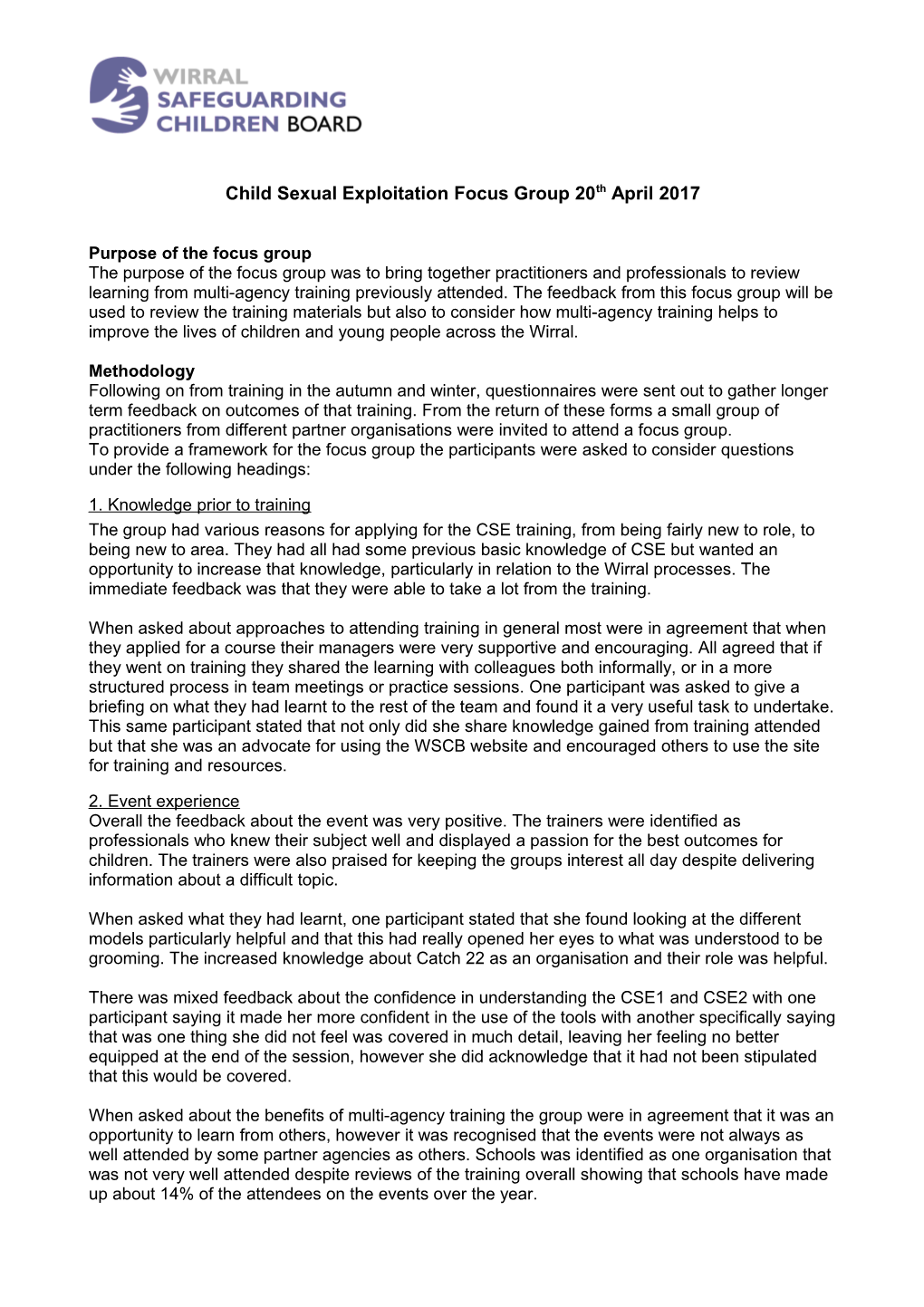Child Sexual Exploitation Focus Group 20th April 2017
Purpose of the focus group
The purpose of the focus group was to bring together practitioners and professionals to review learning from multi-agency training previously attended. The feedback from this focus group will be used to review the training materials but also to consider how multi-agency training helps to improve the lives of children and young people across the Wirral.
Methodology
Following on from training in the autumn and winter, questionnaires were sent out to gather longer term feedback on outcomes of that training. From the return of these forms a small group of practitioners from different partner organisations were invited to attend a focus group.
To provide a framework for the focus groupthe participantswere asked to consider questionsunder the following headings:
1. Knowledge prior to training
The group had various reasons for applying for the CSEtraining, from being fairly new to role, to being new to area. They had all had some previous basic knowledge of CSE but wanted an opportunity to increase that knowledge, particularly in relation to the Wirral processes. The immediate feedback was that they were able to take a lot from the training.
When asked about approaches to attending training in general most were in agreement that when they applied for a course their managers were very supportive and encouraging. All agreed that if they went on training they shared the learning with colleagues both informally, or in a more structured process in team meetings or practice sessions. One participant was asked to give a briefing on what they had learnt to the rest of the team and found it a very useful task to undertake. This same participant stated that not only did she share knowledge gained from training attended but that she was an advocate for using the WSCB website and encouraged others to use the site for training and resources.
2. Event experience
Overall the feedback about the event was very positive. The trainers were identified as professionals who knew their subject well and displayed a passion for the best outcomes for children. The trainers were also praised for keeping the groups interest all day despite delivering information about a difficult topic.
When asked what they had learnt, one participant stated that she found looking at the different models particularly helpful and that this had really opened her eyes to what was understood to be grooming. The increased knowledge about Catch 22 as an organisation and their role was helpful.
There was mixed feedback about the confidence in understanding the CSE1 and CSE2 with one participant saying it made her more confident in the use of the tools with another specifically saying that was one thing she did not feel was covered in much detail, leaving her feeling no better equipped at the end of the session, however she did acknowledge that it had not been stipulated that this would be covered.
When asked about the benefits of multi-agency training the group were in agreement that it was an opportunity to learn from others, however it was recognised that the events were not always as well attended by some partner agencies as others. Schools was identified as one organisation that was not very well attended despite reviews of the training overall showing that schools have made up about 14% of the attendees on the events over the year.
3. Post event
There were some really good examples of how learning from the training had been used in practice. One participant was able to give a really good example of a girl she has been working with that she had recognised as being at risk due to information she was given on the training. As a result she made a referral using the appropriate forms and now the girl and her family are getting the right support through MACSE. The participant stated that the training had increased her confidence in not only recognising risks but also acting on them in a way that allowed her to maintain a positive relationship with the family.
Another participant was able to give an example of sharing information about high risk phone applications to mums she was working with in a refuge.
In response to the question whether anything could be done differently there was nothing suggested, instead the feedback was that the training session was very good.
Impact of training
The focus group has highlighted the impact of training on improving practice and outcomes in several ways:
An increase in confidence for professionals in recognising CSE.
Increased confidence in referring cases where CSE is a risk.
Support provided to families where CSE is a concern, in a way that enables that family/child to make positive changes.
